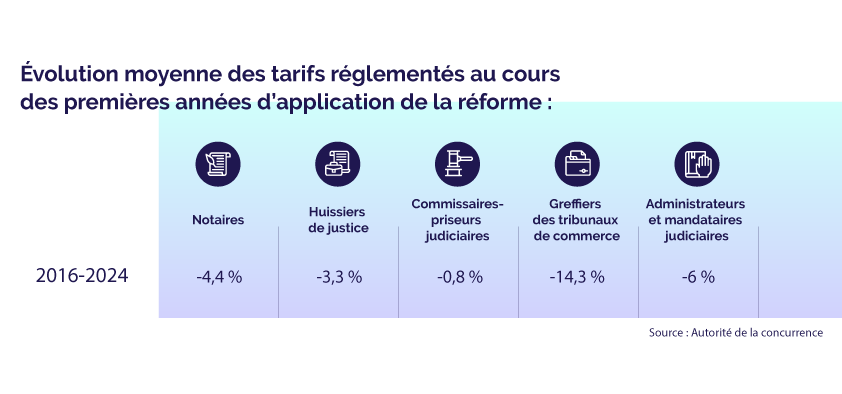Regulating the regulated professions
The Autorité has been involved in the regulation of certain regulated legal professions since 2015, thereby contributing to the implementation of a reform that is modernising the professions while safeguarding the economic viability of existing offices.
The effects have been positive and include better territorial coverage to meet the needs of the population, fairer and more understandable rates for consumers, and the inclusion of women and young talent in the professions.

A quick guide to the regulated professions (in French)
The regulated professions concerned
Six regulated legal professions are covered by the regulatory mission assigned to the Autorité in 2015 by the French law of 6 August 2015, known as the "Macron Law":
- notaries;
- commissioners of justice (formerly court bailiffs and judicial auctioneers);
- commercial court registrars;
- judicial administrators;
- judicial liquidators;
- lawyers to the courts (i.e. lawyers at the French Administrative Supreme Court [Conseil d'État] and French Supreme Court [Cour de cassation]).
On 1 July 2022, the professions of court bailiff and judicial auctioneer merged under the name of "commissioner of justice".
The objective of the reform of the regulated professions
The objective of the reform is to modernise and inject competition into highly regulated sectors.
The gradual opening up of the professions to new professionals encourages the development of competitive emulation within professions that were previously very closed. Young graduates, who are the most directly affected by the reform, can now settle more easily into areas where there is a shortage, while the French will benefit from greater geographical coverage in certain regions.
The reform also establishes the principle of the scalability of rates, some of which have not changed for decades. Thanks to the implementation of a methodology based on the objectification of costs, the French should gradually be able to enjoy fairer and clearer rates.

The role of the Autorité in the reform
Freedom of establishment
Freedom of establishment is an important factor in modernisation, increasing efficiency and reducing territorial inequalities in access to the legal professions.
Every two years, the Autorité makes recommendations to the Ministers of Justice and the Economy with a view to improving access to the offices of commissioner of justice, formerly judicial auctioneer and court bailiff, notary and lawyer at the French Administrative Supreme Court (Conseil d'État) and French Supreme Court (Cour de cassation).
In particular, the Autorité proposes the number of new offices that could be created, to ensure a satisfactory service offer.
With regard to notaries and commissioners of justice, the Autorité produces a map identifying the areas in which the opening of new offices would be beneficial. The map defines green zones, where professionals can freely set up office, and red zones, where the establishment of new offices is subject to control.
Rate scalability
To achieve the objective set by the Macron Law of guaranteeing reasonable remuneration for professionals and rates that take into account the costs incurred, the rates are revised every two years by joint order of the Ministers of Justice and the Economy. The Autorité may be consulted on this review.
In addition, the Autorité must be consulted on any changes to the structure and method of setting rates, which are defined by decree in the French Administrative Supreme Court (Conseil d'État).

In the French overseas territories, the regulated rates, in particular those of notaries and commissioners of justice, may be increased to take into account the additional costs in these territories.
Before the reform, these increases could reach very high levels. For example, notary fee surcharges in La Réunion and Mayotte were 40%. Since the reform, surcharges have been limited and have decreased in the majority of French overseas territories.
